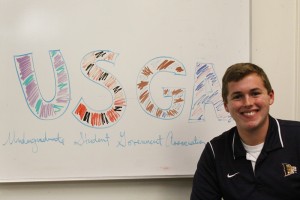Taylor Collins resigned early from her role as president of Drexel’s Undergraduate Student Government Association effective Oct. 23. Kevin Murray, the vice president of the USGA, was internally elected to the role of president to serve until the spring quarter in 2015 and James Gordon, the Engagement and Operations Assembly chair, took his position as vice president.
Collins, a senior health sciences undergraduate in the College of Nursing and Health Professions and the Pennoni Honors College, resigned after six months as President, citing personal reasons. Having served in the USGA for two and a half years, her early departure marked a loss for the USGA executive team and Drexel students of an open, ambitious and visionary young leader who strived to bring changes that would benefit the student body. However, she is confident that the USGA is in very capable hands.
“I am overly confident that [Kevin Murray and James Gordon] will foster a collaborative environment in order to continue USGA’s path towards unprecedented heights with their exceptional leadership qualities,” Collins wrote in her resignation letter. “I want to thank [USGA representatives] all for being such amazing team players and demonstrating drive and passion in the short months that we shared together.”
Collins first got involved with the USGA during her spring term in freshmen year and was elected as Student Organization Representative. Under the leadership of the then-USGA presidents, she recognized the enormous potential of the USGA and developed ideas on how to improve the organization during her freshmen and sophomore years.
The following year, she was elected to the position of vice president and it was in this role that she saw the all the smaller changes that the USGA accomplished that students may not know the organization played a key role in, such as charging stations for cell phones, creating the Academic Center for Engineers and changing the times the shuttle is offered to Center City to accommodate College of Nursing and Health Professions students.
Collins wanted to find better methods of communicating the achievements of the USGA to the student body in order to raise the organization’s profile and help students understand the importance and potential of having an organized and effective liaison between students and the University administration.
“Getting these accomplishments out to the student body has proven a challenge in past years,” Collins wrote in an email. “But I am confident that our communication with students this year can change their perspective on USGA and exactly what it is a student government can do for you.”
She had several ideas on how to accomplish this goal and ran for president on the promise of giving students more opportunities to communicate their demands to University officials. Collins’ message was heard and she was elected to the role of president of the USGA in June of this year. She was sworn in with the other elected representatives by the departing president during week four of the summer term during a general body meeting and spent the first three weeks of her term training the new representatives.
One of Collins’ major goals as president was to bring back town hall meetings and open-style forum events because she felt that they were vital effectively serve the student body. She believes that it’s the job of the elected representative to go to the students and give them the opportunity to voice their needs rather than wait for students to come to the representative. The open-style forum gives students an informal place to voice their concerns to University officials and is the very first step in the process of initiating change. The next step in the plan is to take the concerns of the students and turn them into goals for USGA to accomplish and prioritize the goals based on importance, feasibility, and relevance.
Another major goal Collins wanted to achieve was to make the USGA and all of its representatives as approachable and accessible as possible. There are several ways students can reach a representative including email which are listed on the USGA website, Facebook and a new form on DragonLink’s homepage where anyone can drop a question, concern, or idea quickly and easily that will be reviewed and addressed by a member of the USGA. Every representative also holds their own office hours located in the USGA office, Creese 051, with an open door policy to encourage students to drop by and chat, even if they are just wondering what USGA does.
Collins’ proudest achievement during her time as president was creating a collaborative, hard-working and invested group of student leaders capable of accomplishing so much within the scope of their responsibilities.
“It is very satisfying to know I inspired them in some way, shape, or form to serve the students to the best of their abilities,” Collins wrote. “If you look on our Facebook page, there are already numerous town halls and forums that have been planned and utilized by students. I cannot wait to see the reputation of USGA grow this year while being behind-the-scenes and supporting their efforts the entire way.”
Collins stated that her resignation isn’t the end of her involvement with the USGA and will continue to be available as a resource if needed. She plans to ensure a smooth transition and continue to be a student leader even if she doesn’t have an official title. It’s clear that she had a significant impact on the team she helped mold during her short time as president and will be missed by everyone she worked with.
“Taylor was a great president,” Judy Pierson, the current commuter representative of the USGA, wrote in an email. “She was always on top of everything — deadlines, goals, meetings — she was one of the most reliable people I’ve met, even though I’ve only known her for a short time. Even though it didn’t last long, this year’s USGA really thrived thus far, partly because of her leadership. Even though we are all going to miss Taylor, we are glad that she will still be around to support us for further initiatives.”
Murray intends to carry out Collins’ ideas of creating and managing town halls and open-forum meetings by offering all student populations two town halls during the school year with at least one University wide town hall which will be held in the winter term. The hope is that these forums will be productive and beneficial for both students and University officials. In addition, the USGA has a few major plans for the academic year including changes to the co-op employment summary and planner form, better hours for study spaces near the dorm and main residential areas, a service that will allow students living off campus to have a ride to their far residences, and clearer more consistent and open communication between willing students and upper administration.


